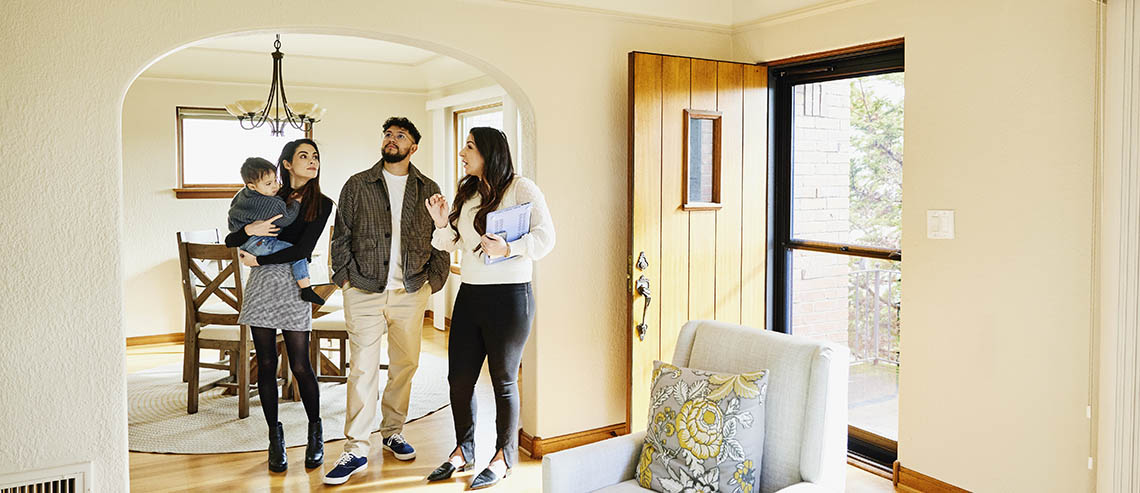
Earn cash back
after close!
With Home Connect, you could earn $350 to $9,500 cash back after close.
For home sellers on a tight timeline or budget, listing a home as is can be an appealing option. Below, we break down the benefits and challenges of selling your house in its current condition and provide other helpful insights for both sellers and buyers.
What It Means to Sell a House As Is
To sell a house “as is” means the homeowner won't make repairs or renovations before selling it to a buyer, regardless of the home’s structural concerns or condition. If you’re considering selling a home as is, you can expect some nice perks, however there could also be a few limitations you’ll want to be aware of.
The Benefits of Selling a House As Is
First, let’s go over some reasons why you might opt to sell your house as is.
- Sell quickly. If you have a pressing timeline and need to sell your home right away without a ton of effort, you have the option of selling it as is. Home-buying companies or cash buyers, like investors, are often eager to take a home off your hands. Especially in a seller’s market, you will likely be able to sell successfully.
- Save money on home improvements. When you sell your house under less urgent circumstances, a common strategy is to get the most money from your sale by fixing up your home before listing it. You may also be required to make repairs to meet certain state standards. The cost of some repairs or updates, especially those regarding safety, often falls to the seller. By selling as is, you can usually avoid those possibly expensive repairs.
- Attract fix-and-flip buyers. Buyers who want to make renovations and changes based on their own preferences appreciate the perk of paying less for an as-is home, and applying the funds saved for custom improvements.
- Less hassle and negotiating. A home inspection that uncovers a lot of issues can cost a decent amount of money upfront. While the seller isn’t necessarily required to make all renovations or repairs, typically the buyer and seller must negotiate who will pay for what. If you don’t want to spend the time and money tackling those projects, it may be harder to sell your house at your original asking price. By selling the home as is, you get to take requested upgrades and repairs entirely out of the equation. However, negotiations over price can still occur if the inspection covers significant problems.
The Potential Challenges of Selling a Home As Is
Selling a home as is can be a great option for some people, but selling your home without repairs or renovations also has its challenges.
Lower Sale Price
Smaller Buyer Pool
Usually, you will make less money selling your home as is than with a traditional listing.
Since homes listed to sell as-is often need repairs that the owner wants to avoid paying for, these listings are more likely to attract buyers looking for a deal. Unfortunately, even if your home is in excellent condition, if you list it with an as-is clause, it is generally expected that you sell your home at a lower price.
Since the majority of buyers typically prefer a home to be move-in ready, you may have a smaller buying pool for your fixer-upper.
Securing financing can also be a potential issue, since many lenders require the home to meet certain conditions. The affordability of the mortgage can play a part as well, given that the buyer will be purchasing the home with a financial commitment to make improvements.
Further, some buyers may not want to hire contractors to assess the home and give a price estimate.
Buyers may already be hesitant about taking on a project, especially with the additional cost of hiring contractors. That being said, sellers are still legally and ethically obligated to disclose major issues to buyers, which can lower the home’s value.
Alternatives to Selling a House As Is
If selling your house as is isn’t right for you, there are a few viable alternatives to consider:
- Update and repair. Invest some money and time to fix and update your home. With a few repairs and renovations, you may be able to sell at a higher price than selling as is.
- Rent your home out. If you don’t need to sell your home for a down payment on your next home, you may be able to rent it out. This may be an especially practical option if you live in a tourist area, college town, business district or other strong rental market location.
How to Sell a House As Is
If you’re ready to sell your house as is, here are some tips to help with the process.
Know the Type of Buyer You Want To Attract
Consider the Condition of Your Home
Sell in the Right Market
- Mortgage interest rates
- Employment and income stability
- Local housing supply and demand
- Cost of living
- Consumer confidence
Emphasize Selling Points
How Much Do You Lose Selling a House As Is?
There will be a big difference between your average buyer seeking a home to live in and an investor looking to flip your house. Investors specifically go after as-is homes and have the upfront cash needed to buy your property, so your house doesn’t need to meet too many conditions to be competitive.
Someone in the market for a move-in ready home will have much different expectations. While they won’t expect you to fix your home, they will expect to pay less for your home than it would otherwise go for. Keep in mind that even if a buyer is seeking an as-is home, they will still likely hesitate to make an offer on homes that need major renovations.
Like with a more traditional sale, your home will still have an appraisal and an inspection, affecting the purchase price.
If your home is in moderately good condition and still livable, your house could be an optimal option for more typical homebuyers. If your house will be a big reno project, you should target investors to get the most money off the sale.
A seller’s market — when there’s more home demand than supply — is the best time to sell your home as is. With fewer homes available, buyers may be more open to purchasing a property that needs work simply to secure a place to live.
Plus, in a seller’s market, sellers often have more pricing power, which can help offset the typical discount associated with selling as is.
Factors that contribute to whether it’s a buyer's or seller’s market include:
These factors may vary by region—and even neighborhood—so understanding your local market plays a key role in how your as-is home will be received.
For most buyers, finances are a significant factor in selecting a home — and a home with lots of repairs and renovations means lots of extra expenses. However, some as-is homes may have other desirable traits that make the purchase worthwhile. For example, location is key for a lot of people. If you have a home in a highly sought-after neighborhood, there’s a better chance that you’ll be able to sell your house as is.
You usually won’t make the same amount selling your home in as-is condition as you would selling it the traditional way. While there’s no single answer to this question, most as-is sellers can expect to get between 75 and 95 percent of their home’s value.
Buying a House As Is
If you are considering buying a home as is, here are three steps to help you make an informed decision.
Step 1: Plan for a Home Inspection
You should always get a home inspection if you’re seriously considering buying. This is especially essential for as-is homes.
Sellers shouldn’t hide issues with their homes, but they may not always be forthcoming or even be aware of certain problems. A home inspection lets you know what you’re working with so you don’t invest all of your time and resources into a money pit.
Step 2: Know the Lender’s Required Home Inspection Standards
If you plan to finance your home purchase, it’s important to know that even an as-is home must meet your lender’s minimum property standards. Most mortgage lenders require the home to be safe, structurally sound and habitable. If the property has major issues—like a damaged roof, faulty wiring, or plumbing problems—it may not pass inspection and could delay or prevent loan approval. Ensure that you assess whether the home is likely to meet these standards before making an offer.
Step 3: Rely on Experts
A good real estate agent will help you navigate and negotiate buying a home as is. Sellers have every right to sell their home exactly as it is, but they are also legally required to disclose details about their home, including any issues. As a local expert, your agent should know the market conditions and can help you determine whether or not you should commit to an as-is home.
Also note that if a lender won’t approve a certain loan amount for a home, that indicates that the property isn’t suitable for living in and may not be worth your efforts and time unless fixed.
What To Know About the “As-Is Condition” Clause
Sellers of as-is homes are responsible for disclosing known problems with the property. An “As-Is Condition” clause is part of the real estate contract that protects the seller from liability should the buyer discover defects with the home after purchasing it.
The as-is clause explains that the buyer is willing to accept the home in its current condition and agrees to forego requesting repairs or a price reduction based on property problems. However, the as-is clause does not relieve a seller from liability should it be found that they intentionally misrepresented a defect or did not disclose a known problem.
The Right Move for You
Deciding whether to sell your home as is depends on your timeline, budget and your property’s condition. Curious how much your home is worth? Visit the Pennymac home value estimator to see an instant estimate of your home's current value and view recent home sales in your area.
FAQs When Selling a House As Is
What do I need to know about disclosure laws?
Even if you’re selling a home as is, you still need to comply with your state’s disclosure laws. These laws require sellers to share any known issues or defects with prospective buyers before the sale is completed. This is typically done using a seller’s disclosure form that asks you to answer questions about the property’s condition, history and any known problems. Disclosure requirements differ by state, but they often cover things like:
- Previous water damage or flooding
- Termite or pest problems
- Mold or mildew concerns
- Foundation or structural issues
- Lead paint
- Roof leaks or damage
- Faulty electrical or plumbing systems
- Presence of asbestos or radon
- History of fire, storm or other major damage
- Deaths on the property
You’re only expected to disclose what you’re already aware of. However, you are legally required to answer any questions truthfully and disclose known problems to the best of your knowledge.
Will buyers still get a home inspection?
Yes. Buyers can, and are encouraged to, get a home inspection, even when purchasing a home as is. The inspection helps the buyer understand the property's condition and identify any major issues or necessary repairs.
Can the buyer still negotiate after the inspection?
Yes. Even in an as-is sale, the buyer can try to negotiate after receiving the inspection report. While the seller isn’t required to make repairs, the buyer might request a price reduction, credit toward repairs or other concessions. The seller can accept, counter or decline. Regardless of the outcome, any newly discovered issues must now be disclosed to future buyers, which can give the current prospective buyer added leverage in negotiations.
Does selling as is mean I can’t sell to buyers using financing?
No. Selling a home as is doesn’t automatically exclude buyers who need financing. However, lenders have certain standards a property must meet to qualify for a mortgage. These are called minimum property requirements (MPRs). If your home has major issues—like structural damage or safety hazards—it could make it harder for a buyer to secure financing.
Who usually buys “as-is” homes?
Homes sold as is often attract cash buyers, investors or house flippers who do not require financing and are willing to take on repairs themselves. That said, if the home is generally sound and move-in ready, it can still appeal to traditional buyers using a mortgage.
Should I make any repairs before listing "as is"?
Not necessarily. Selling "as is" means you’re not required to make repairs before listing. But addressing major issues, especially ones that could affect a buyer’s financing, could help you attract more prospects. Small improvements like fresh paint, cleaning or yard work may also boost appeal and value.
If you want a fast sale and price accordingly, skipping repairs is typical. But if your goal is to get the highest price and you have the resources, targeted updates could increase your return.
Ultimately, whether or not selling your house “as is” would be the better option depends on your specific situation. To better understand your options and what’s right for you, consult with a real estate professional or mortgage expert.
*Local markets and customs can vary greatly regarding representations and warranties concerning the condition of a home. When a home is listed “as is,” it’s typically a signal to buyers that the seller won’t make repairs or offer credits before the sale. Consult your real estate professional regarding the custom in your market area.
Share
Categories





